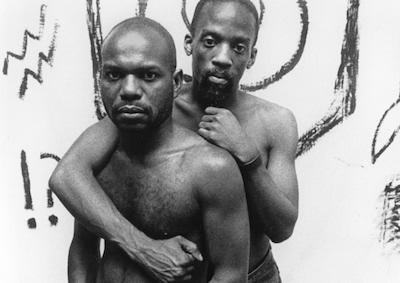Pictured above: Tongues Untied (dir. Marlon Riggs, 1989). Credit: Signifyin' Works.
Special thanks to our community partners: Los Angeles LGBT Center, UCLA LGBTQ Campus Resource Center.
Restoration funded by The Andy Warhol Foundation of the Visual Arts, Hollywood Foreign Press Association, and IndieCollect Donors Circle
Coming Out Under Fire
1994
Award-winning filmmaker and author Arthur Dong’s 1994 Coming Out Under Fire is the first of three expertly and efficiently crafted documentaries about homosexual repression and persecution which are now considered by many as his “Roots of Homophobia” trilogy. Dong’s 1997 Sundance Award-winning Licensed to Kill takes a harrowing look at seven men convicted of murdering homosexual victims. His 2002 film Family Fundamentals follows three conservative Christian families grappling with their convictions when a family member comes out of the closet. But it is this earlier, broader-scoped documentary about homosexuals in the military during World War II that is the filmmaker’s cornerstone representation of the systemic and administrative subjugation of queer communities. With the current political climate and national polarization, these three groundbreaking documentaries have never been more suitable for rediscovery.
Based on the landmark book by Allan Bérubé, Coming Out Under Fire fuses captivating interviews with nine gay women and men with archival images and documentation, as well as the 1993 Congressional debates around gays in the military. The political birth of "Don’t Ask, Don’t Tell" in this era serves as a prescient backdrop to the protagonists’ heartfelt and resilient stories in the face of systemic and administrative subjugation. The film’s powerful and poignant message was celebrated widely, and the film went on to win top film festival awards at Sundance, Outfest, Berlin, Chicago, and San Francisco to name a few.
Besides his LGBTQ activist films, Arthur Dong (b. 1953) celebrates his Chinese American cultural heritage with the widely respected documentaries Forbidden City, U.S.A. (1989) and Hollywood Chinese (2007), in addition to his earlier short films. His media archive is vaulted at the UCLA Film & Television Archive in both the Outfest UCLA Legacy Project Collection and the Sundance Institute Collection.
—Todd Wiener
DCP, b&w, 71 min. Director: Arthur Dong. From the book by Allan Bérubé. Screenwriter: Arthur Dong. With: Salome Jens, Phillis Abry, David Barrett, Alan Bergreen, Pat Bond. New 4K restoration by IndieCollect and UCLA Film & Television Archive.
Tongues Untied
1989
Marlon Riggs’ essential 1989 work can be experienced in many different capacities. As a poetry film, it plays with human voice, memory and expression to evoke rhythms of love and confusion. As a documentary, it captures histories of eroticism and transcendence among Black, gay Americans, and the sometimes violent conflicts of their intersecting identities and external pressures. As a piece of American history, it is a marker of the censorship enforced by the National Endowment for the Arts’ defunding of arts related to AIDS—an egregious, homophobic policy that still resonates today.
Tongues Untied is as personal as it is political, with a lyricism that haunts, engages, and informs. Along with poet and collaborator Essex Hemphill, Riggs (1957-1994) creates a tonally dynamic space to explore the identities of Black gay men. Moving from stark montage, to double exposures of sexual and revolutionary awakening, to spoof chat lines, and much more, Riggs’ thematic vignettes challenge the audience to keep up. This is a call to arms, a confession, and a locomotive photo album that, similarly to another seminal documentary released the same year, Surname Viet Given Name Nam (Minh-ha, 1989), defies conventional ethnography. Truth and realness may be merely in the eye of the beholder, but with Riggs’ painstaking, daring storytelling, they are also in the fingers, ears and mouths of some of the most marginalized subjects and dismissed creators of culture of the U.S. population.
—Shayna Warner
DCP, color, 55 min. Director: Marlon Riggs. Screenwriters: Joseph Beam, Chris Harris, Essex Hemphill, Reginald Jackson, Steve Langley, Alan Miller, Marlon Riggs, Donald Woods. With: Marlon Riggs, Michael Bell, Kerrigan Black, Blackberri. DCP courtesy of Frameline.






 Mobile Navigation
Mobile Navigation

